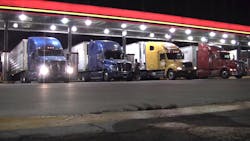We have long known about the role of drivers in improving MPGs. We got some additional confirmation during Run on Less, when one of the drivers — Henry Albert — told us that he had three of his top five MPG days while driving in the Run. Henry, as many of you know, is a member of Team Run Smart and is a fuel efficiency devotee, as are all the drivers in the Run.
Henry said the Run put him in a competitive mode to the point that he thought about MPG every second of every day. In fact, he did not even take time to get his truck washed over the course of the three-week Run. He told us he had never gone three weeks without washing his truck but during the Run didn’t want to waste time (and fuel) sitting in line at a truck wash.
And just the other night, another Run on Less driver, Joel Morrow of Ploger and my travels interconnected, and Joel told me that the Run was so much fun because it caused him to be “ON his game, every mile of the three weeks!”
Now NACFE is not advocating skipping the truck wash, or expect all of you drivers to be totally ON your game all the time, but we hope more drivers will take the attitude of the drivers in the Run and think about fuel economy more often than they probably do. To think about idling and truck stop time and proper acceleration techniques and appropriate engine and road speed.
The PIT Group came out with some studies recently that acknowledge the driver’s role in fuel efficiency but also found that if fleets want all their drivers to drive in a fuel- efficient manner, they need refresher courses in how to do that. With fuel-efficient driving it is not just one and done.
According to the PIT Group studies, a variety of methods can be used to train drivers from classroom to simulators to in-cab.
I would add to that list having your fuel efficiency guru share his of her best practices with all the drivers in your fleet. Maybe by doing all these things every driver will be singing the praises of fuel-efficient driving. Perhaps then 10.1 MPG will become the industry average instead of a number achieved by seven drivers during a fuel efficiency challenge.
About the Author

Michael Roeth
Executive Director
Michael Roeth is the executive director of the North American Council for Freight Efficiency. He serves on the second National Academy of Sciences Committee on Technologies and Approaches for Reducing the Fuel Consumption of Medium and Heavy-Duty Vehicles and has held various positions with Navistar and Behr/Cummins.
